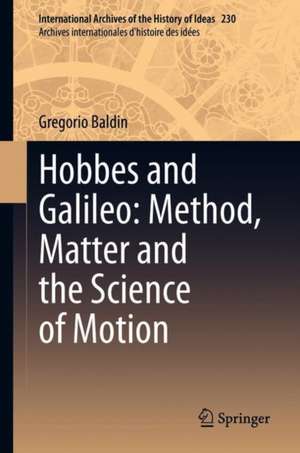Hobbes and Galileo: Method, Matter and the Science of Motion: International Archives of the History of Ideas Archives internationales d'histoire des idées, cartea 230
Autor Gregorio Baldinen Limba Engleză Hardback – 16 apr 2020
| Toate formatele și edițiile | Preț | Express |
|---|---|---|
| Paperback (1) | 624.89 lei 6-8 săpt. | |
| Springer International Publishing – 16 apr 2021 | 624.89 lei 6-8 săpt. | |
| Hardback (1) | 630.97 lei 6-8 săpt. | |
| Springer International Publishing – 16 apr 2020 | 630.97 lei 6-8 săpt. |
Din seria International Archives of the History of Ideas Archives internationales d'histoire des idées
- 24%
 Preț: 679.96 lei
Preț: 679.96 lei -
 Preț: 378.08 lei
Preț: 378.08 lei -
 Preț: 372.60 lei
Preț: 372.60 lei -
 Preț: 374.69 lei
Preț: 374.69 lei -
 Preț: 374.51 lei
Preț: 374.51 lei -
 Preț: 373.76 lei
Preț: 373.76 lei -
 Preț: 372.80 lei
Preț: 372.80 lei - 18%
 Preț: 1198.92 lei
Preț: 1198.92 lei -
 Preț: 372.06 lei
Preț: 372.06 lei -
 Preț: 391.27 lei
Preț: 391.27 lei - 18%
 Preț: 930.78 lei
Preț: 930.78 lei -
 Preț: 377.34 lei
Preț: 377.34 lei - 18%
 Preț: 933.88 lei
Preț: 933.88 lei - 15%
 Preț: 635.13 lei
Preț: 635.13 lei - 15%
 Preț: 628.07 lei
Preț: 628.07 lei - 18%
 Preț: 935.58 lei
Preț: 935.58 lei - 18%
 Preț: 925.06 lei
Preț: 925.06 lei - 15%
 Preț: 630.01 lei
Preț: 630.01 lei - 18%
 Preț: 1793.61 lei
Preț: 1793.61 lei - 18%
 Preț: 1199.70 lei
Preț: 1199.70 lei - 15%
 Preț: 631.61 lei
Preț: 631.61 lei - 15%
 Preț: 620.72 lei
Preț: 620.72 lei - 15%
 Preț: 634.00 lei
Preț: 634.00 lei - 18%
 Preț: 1208.05 lei
Preț: 1208.05 lei -
 Preț: 382.41 lei
Preț: 382.41 lei - 18%
 Preț: 926.76 lei
Preț: 926.76 lei - 18%
 Preț: 932.62 lei
Preț: 932.62 lei - 18%
 Preț: 1194.90 lei
Preț: 1194.90 lei - 15%
 Preț: 625.34 lei
Preț: 625.34 lei - 18%
 Preț: 1198.61 lei
Preț: 1198.61 lei
Preț: 630.97 lei
Preț vechi: 742.31 lei
-15% Nou
Puncte Express: 946
Preț estimativ în valută:
120.79€ • 125.56$ • 100.15£
120.79€ • 125.56$ • 100.15£
Carte tipărită la comandă
Livrare economică 06-20 februarie 25
Preluare comenzi: 021 569.72.76
Specificații
ISBN-13: 9783030414139
ISBN-10: 3030414132
Pagini: 216
Ilustrații: XXIII, 216 p. 31 illus.
Dimensiuni: 155 x 235 mm
Greutate: 0.52 kg
Ediția:1st ed. 2020
Editura: Springer International Publishing
Colecția Springer
Seria International Archives of the History of Ideas Archives internationales d'histoire des idées
Locul publicării:Cham, Switzerland
ISBN-10: 3030414132
Pagini: 216
Ilustrații: XXIII, 216 p. 31 illus.
Dimensiuni: 155 x 235 mm
Greutate: 0.52 kg
Ediția:1st ed. 2020
Editura: Springer International Publishing
Colecția Springer
Seria International Archives of the History of Ideas Archives internationales d'histoire des idées
Locul publicării:Cham, Switzerland
Cuprins
1. Hobbes and Mersenne.- 2. Hobbes: Principles of Galileian Philosophy.- 3. Galileo’s Momentum and Hobbes’ Conatus.- 4. The Paradoxes of Matter.- Conclusion.
Recenzii
“Baldin’s work represents a milestone in the research of the historical dependencies between Hobbes and the cultural milieu from which his philosophical and scientific views stemmed, and the author deserves merit for composing such an interesting and exhaustive investigation.” (Federico Pierucci, Nuncius, Vol. 35, 2020)
Notă biografică
Gregorio Baldin (1986) is currently professor of philosophy and history at the high school in Oulx (Turin, Italy), and associate researcher at the University of Piemonte Orientale and IHRIM (Institut d'Histoire des Idées et des Représentations dans les Modernités) - École Normale Supérieure de Lyon. He obtained his PhD in philosophy and history of philosophy in 2015 (supervisor: Gianni Paganini); he has been postdoc at École Normale Supérieure de Lyon (LabEx Comod) and Ca' Foscari University of Venice. His researches mainly deal with the spread of scientific and political ideas in seventeenth century, by focusing on Thomas Hobbes and Paolo Sarpi. He is the author of Hobbes e Galileo. Metodo, materia e scienza del moto (Florence: Olschki, 2017), and La croisée des savoirs: Hobbes, Mersenne, Descartes (Milan: Éditions Mimésis, 2020). He also published several articles on Rivista di storia della filosofia, Giornale critico della filosofia italiana, Galilaeana, Storia del pensiero politico.
Textul de pe ultima copertă
This book, translated from Italian, discusses the influence of Galileo on Hobbes’ natural philosophy. In his De motu, loco et tempore or Anti-White (~ 1643), Thomas Hobbes describes Galileo as “the greatest philosopher of all times”, and in De Corpore (1655), the Italian scientist is presented as the one who “opened the door of all physics, that is, the nature of motion.” The book gives a detailed analysis of Galileo’s legacy in Hobbes’s philosophy, exploring four main issues: a comparison between Hobbes’ and Mersenne’s natural philosophies, the Galilean Principles of Hobbes’ philosophical system, a comparison between Galileo’s momentum and Hobbes’s conatus , and Hobbes’ and Galileo’s theories of matter. The book also analyses the role played by Marin Mersenne, in spreading Galileo’s ideas in France, and as a discussant of Hobbes. It highlights the many aspects of Hobbes’ relationship with Galileo: the methodological and epistemological elements, but also the conceptual and the lexical analogies in the field of physics, to arrive, finally, at a close comparison on the subject of the matter. From this analysis emerges a shared mechanical conception of the universe open and infinite, that replaces the Aristotelian cosmos, and which is populated by two elements only: matter and motion.
Caracteristici
Presents the first detailed analysis about Galileo’s legacy in Hobbes’s thought Contains the first comparison between Mersenne’s and Hobbes’s natural philosophies Investigates the conceptual and theoretical roots of Hobbes’s philosophy
